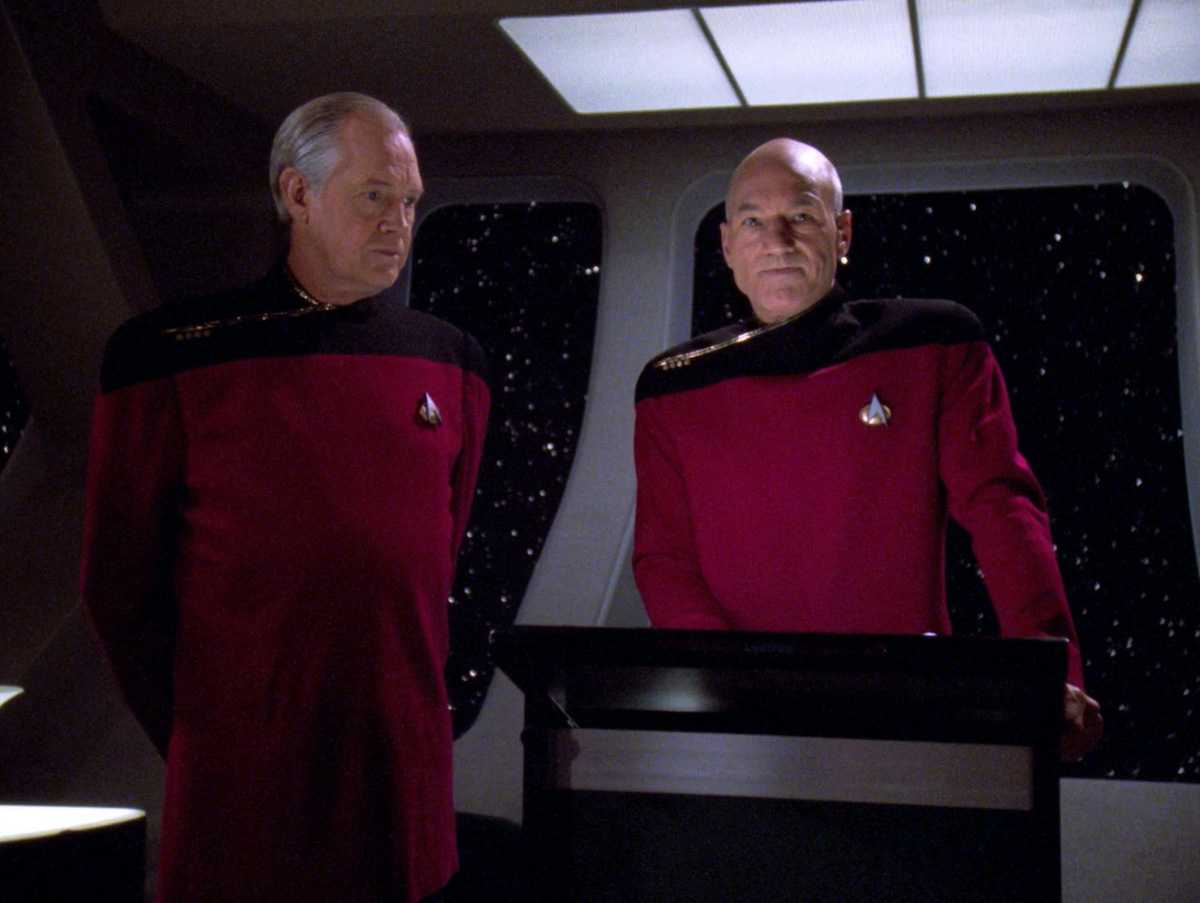“A challenge. You should prove an interesting challenge.”
We have arrived at, arguably, the apex of Star Trek: The Next Generation‘s pop cultural power: the week it gave birth to a spin-off. I can’t recall if “Chain of Command” coincided with, or immediately preceded, the launch of Star Trek: Deep Space Nine, but it was all hands on deck for this season in Star Trek history. The third Trek series, whose creative and narrative accomplishments are so enormous that they really deserve their own rewatch blog [cough blu-ray, CBS? cough], was proof positive that Next Gen had, in less than six full years, gone from unpopular gamble to franchise-building mainstay. And by running both series simultaneously, Paramount and Rick Berman were in some ways anticipating the birth of the mega-franchise in popular entertainment, some fifteen years later.
“Chain of Command” has little to do with Deep Space Nine overall, besides polishing up the Cardassians (introduced just 2 years prior, in Season 4’s excellent “The Wounded”) to premier status among the Star Trek rogues’ gallery. The effort doesn’t entirely take here, but the effect paid off marvelously on Deep Space Nine, where the shark-skinned villains really did become one of modern Star Trek‘s most complex and fascinating creative endeavours.
But that’s for another rewatch blog [cough – COUGH – COOOOUUUUUGHHHH]. In the meantime we have a big, classy two-parter for the Next Gen crew, in which (in Part 1), Captain Picard gets replaced as captain of the Enterprise by the fierce (and fiercely unpopular) Captain Edward Jellico. The episode becomes a nice little study on what happens to a team when they’re placed under a new leader, and the briskly efficient Jellico also becomes a standing argument for the possibility that our heroes have become, by this point in their time on the Enterprise, a bunch of spoiled little babies.
Jellico’s manner is brusque (swapping out Picard’s “make it so” for “get it done” gets the point across nicely) but thankfully, the episode never kowtows to the temptation to make Jellico anything less than ruthlessly competent, rather than investing him with a defect that would be face-saving for the Enterprise regulars who just don’t take to him. Jellico may not be the norm for life aboard the Enterprise, but it’s hard not to like him a little bit, and respect him a lot. He calls everyone by their first name, which beautifully skirts the border between friendly and condescending. And he finally says what we’ve all been thinking: why doesn’t Troi dress like a proper Starfleet officer?
Most importantly, though, he doesn’t care. Jellico is perfectly set up as an alternate to Picard because his priorities in life are so completely different from Picard’s. He’s not an explorer; he’s an expert on combat and on the Cardassians; and his emotional investment lies with his family, not with the crew. He treats his assignment honestly, and with a minimum of fuss. Everyone else, in direct reaction, fusses overtime, and looks the worse – bordering on unprofessional – for it.
Meanwhile, Picard, Crusher and Worf are sent on a Mission: Impossible behind the Cardassian frontier. It’s the much less interesting part of the episode overall, though I can’t complain about the choice of traveling companions. It’s just standard run-and-jump on the Planet Hell set, and it doesn’t have anything inventive or sharp about it. Which, given that it’s all a fake-out to capture Picard, fits well enough.
Four Enterprises out of five.

Blogging The Next Generation runs every Tuesday as I work my way through the episodes of Star Trek: The Next Generation on blu-ray. Season Six is in stores.
